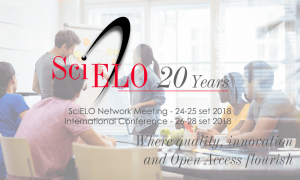By Abel L. Packer

Image adapted from the original, by peoplecreations / Freepik
The SciELO 20 Anos week will comprise two main events. The SciELO Network Meeting, on September 24 to 25, and then the SciELO 20 Years Conference, on September 26 to 28. The organization and schedule of the week are updated daily on the website <www.scielo20.org>.
The Meeting of the SciELO Network aims at a collective meeting of its actors to analyze the status of the journals and the network, and to engage in dialogue on the conditions, ways and solutions to advance editorial quality, the journals’ visibility and their alignment with good practices of open science communication. It is a huge challenge – there are 16 countries with different levels, conditions, and capacities of network insertion, yet they all share similar needs and purpose, commitment and expectation of improvement of the journals and the research they publish, reaffirming of the necessity of developing and strengthening the infrastructures and scientific communication capabilities of a broad network of institutions.
The SciELO 20 Years Conference will have as main objective the analysis and debate of the state of the art of research communication, trends and innovations, with the transition to open science as a strategic issue. In fact, the conference program is organized according to four thematic lines aligning the journals with open science, each of them made of three panels. The conference program will be analyzed in forthcoming posts.
Network Meeting Working Groups – Yesterday, today and tomorrow of SciELO journals
To contribute proactively to the improvement and credibility of quality journals edited nationally by scientific societies, professional associations and academic institutions is a specific objective of the SciELO Program under the umbrella of its mission and general objective to contribute to the advancement of research and democratization of publication and access to knowledge. These journals play an essential and often unique role in the global research communication system. Upon completion of 20 Years of regular operation, SciELO reaffirms its objectives and promotes discussions and debates to support the advancement of the program and journals following the best communication practices of open science.
The first day of the SciELO 20 Years week, September 24, will be dedicated to meetings of working groups of editors and editorial teams of SciELO journals as well as researchers, information and scientific communication professionals. Around 10 to 12 working groups will be organized to analyze key topics for the improvement and enhancing the credibility of SciELO journals. Each group will have its framework defined by a script on the scope of the group, a coordinator, a rapporteur, a working agenda and a series of supporting documents. It will be the coordinator’s task, supported by the SciELO team, to promote the formation of the group, define the agenda, commission the texts to support the discussion and coordinate the discussions. It is the rapporteur’s responsibility to organize, with the support of the SciELO team, the support documentation of the group’s discussion, and, together with the coordinator, prepare a report that will be presented in the next day’s plenary session. The group may also publish a detailed report, one or more articles, analyzes or posts on the discussions, conclusions and recommendations produced.
September 25, the second day of the network meeting, will be dedicated to socializing the conclusions, discussions, recommendations of the working groups and sharing the priority lines of action of the SciELO Network for the coming years.
After SciELO 20 Years Week, an editorial committee will analyze the documents, conclusions, recommendations and news ideas produced by the SciELO Network Meeting and other events in order to elaborate a synthesis report of the recommendations on policies, methodologies and technologies towards global and inclusive scholarly communication, particularly to the improvement of the SciELO Program and its journals.
Proposals for the working groups
Proposals and definitions for working groups that will address topics of interest to the future of SciELO journals will take place by the end of July. For a topic to be discussed in a working group it is necessary for it to have at least 15 participants, mostly related to national collections or SciELO journals. Support documentation should promote a minimum of five hours’ worth of discussion.
The expectation is to have 9 to 12 groups with an average of 20 participants per group. Each group should have at least four technical documents to support the discussion. The documents will be made available to the participants prior to the meeting. Whenever possible, the documents will be made publicly available to receive comments other than from the participants of the working groups.
In general, the formation of groups oriented to the discussion of the following themes is being considered:
- Progress status of the SciELO network collections and priority lines of action for the years 2019-2023 aimed at updating the SciELO publishing model in line with good practices of open science;
- SciELO Network journals performance according to different criteria and approaches;
- Relevance of SciELO journals for the development of research, learning, public policies and national development. One approach is the historical contribution of journals to the development of disciplines and researchers and practitioner’s communities. Another is the current and future relevance of journals from different thematic areas;
- Methodological aspects and good editorial practices, such as a comprehensive view of peer review (relevance, modalities, openness), data science technologies applied to SciELO bibliographic data, etc.;
- Institutional portals of journals and their rationale and compatibility with the SciELO publishing model; and
- Academic books in research communication and interoperability with the SciELO publishing model.
Proposals for themes and coordinators of the working groups should be sent to <scielo20@scielo.org> with “Working Group” as subject.
Translated from the original in Portuguese by Lilian Nassi-Calò.
Como citar este post [ISO 690/2010]:















Read the comment in spanish, by Santovenia Diaz:
https://blog.scielo.org/es/2018/06/08/el-manana-de-las-revistas-scielo-sera-discutido-por-grupos-de-trabajo-tematico-en-la-reunion-de-la-red-scielo-de-la-semana-scielo-20-anos/#comment-41646